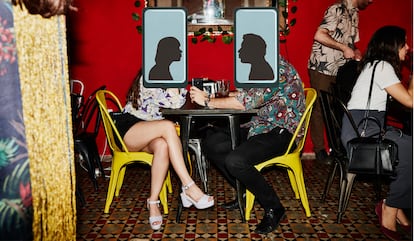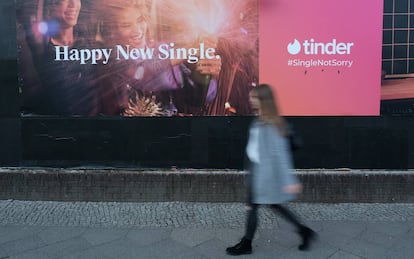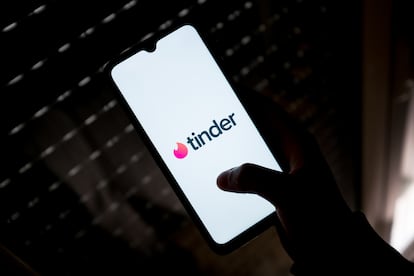The ‘gamification’ of love: Why dating apps have become addictive
These applications reel the user in with gaming features and mechanics, encouraging them to spend an increasing amount of time scrolling through profiles and initiating conversations

Andrea Gil has “swiped” Tinder. That’s how she puts it as if the dating app were a video game. A 36-year-old from Madrid, she goes through profiles at a feverish pace, her fingers moving with the agility of a pianist: left, right, left, right. Until there are none left. Then a message appears announcing, “there are no more singles in your area.” Game over. The expression is appropriate not only because of its ingenuity, but also because dating apps are becoming more and more like video games.
A study by Stanford University in the US found that 39% of heterosexual couples and 60% of same-sex couples meet through dating apps. And one in five couples who married in Spain in 2019 met online, according to the wedding platform, Bodas.net. On the positive side, this means it is now easier to meet someone without needing to be introduced by friends or going to a nightclub. Hooking up is faster and within anyone’s reach. But there are also side effects. One of them is the gamification of dating, a way of wrapping the search for a partner in game dynamics to keep the user on the platform.
The problem lies in the very mechanics of the app. To connect with a partner and be able to talk to them, Tinder asks the user to swipe the profiles of the candidates to one side or the other, accepting or rejecting them, in an almost endless carousel of suitors. According to various studies, Tinder has 57 million users in 190 countries who, together, swipe 1.5 billion profiles a day. The photos are sifted through in much the same way as chrome cards are passed around in the school yard. This one yes, this one no. That’s why many users call the constant search for matches “collecting chromes.”
“I’m not unhappy with these apps,” says Gil, who has used almost all of them in the last seven years, “but I think there have been times when I’ve felt hooked. It creates an addiction that keeps you searching – instead of engaging in conversation with people, you keep scrolling through profiles. It’s just something I do mechanically, when I’m on the subway, or watching TV or in my free time.”
Gil is not unusual. One in six singles admits to feeling addicted to the matchmaking process, according to a 2017 report from Match, the parent company of the dating apps Tinder, OKCupid, Pairs and Hinge. But the addictive factor doesn’t affect everyone equally. Millennials are 125% more likely to become hooked than previous generations and men, 97% more so than women. What’s concerning is that this effect is not random; rather, it is intentional and has been carefully designed to produce this result.

The so-called infinite swipe is a mechanism similar to that used by social networks such as Facebook, Twitter or Instagram, in which case it is the infinite scroll, to keep the user engaged with endless publications. “This system has been found to trigger dopamine secretion, creating some degree of addiction,” says California psychologist Alina Liu. “What happens in our brains on these apps is quite similar to what happens with gambling or slot machines.”
It is a variable reinforcement program in which a reward hovers on the horizon. “The hope of getting this reward, in this case a match, motivates us to keep swiping,” adds Liu. The problem is that with dating apps, the reward is not seeing an interesting post, or even three red cherries and a pile of change. It’s physical validation, a potential date and, who knows, maybe the love of your life. Pressing those emotional buttons can earn apps a lot of money. Tinder told EL PAÍS that free users can only accept 20 candidates a day and that its business model is not based on user retention, but on the user opting for a paid account.
In any case, it is a model that works. In the first quarter of 2022, the Match Group announced a turnover of $3 billion. Tinder has 163 million premium users, making it the highest-grossing lifestyle app worldwide, according to the company’s own data.
“These apps have put dating through a capitalist filter and turned it into an addictive game,” says Liu. “The problem lies in their business model: they generate revenue through subscriptions and ads, so their profits are linked to users spending the day swiping left and right on their platforms.” That’s why they are constantly looking for new features to retain the user on the app. Recently, Tinder has added playful features like Swipe Night, an interactive mechanism that asks the user to make moral choices – save the girl and risk your life or run away from danger – that can impact who they connect with in the future. Gamification is becoming more evident and is justified by the company as a way to become better acquainted with the preferences of generation Z. “They tempt you all the time, telling you to keep going, keep at it,” Gil explains.
But while apps can use features to try to keep the user hooked, the user has the last word. The problem is not only in the algorithm or the design of the app, it is in the user’s personality or their environment. “For me, the emotional discomfort in the person who develops the addiction is clearly more relevant,” says psychologist Paloma Salamanca Iniesta. “We are constantly surrounded by addictive substances and experiences – tobacco, coffee, gambling – but we usually don’t get sucked into any of them unless we are going through a moment of particular psychological vulnerability.”

According to a report from dating app Badoo based on data from its 370 million users, a millennial will spend, on average, 90 minutes a day on it. These timeframes can soar if the person goes through a rough patch or develops a certain degree of dependency.
Apps don’t always take advantage of vulnerability. Several are establishing digital wellness measures. Bumble periodically releases messages to its users to minimize the negative impact dating apps can have on their self-esteem. “Our app has a number of features that put mental health and self-care at the forefront, such as the Snooze feature, which gives you the opportunity to pause your activity and come back when you’re ready,” says Naomi Walkland, Bumble’s vice president for Europe. Thursday goes one step further. This app is only active one day a week and is based on creating events in bars and boosting encounters beyond the platform.
However, the general trend is to maximize the user’s time on the app and get them to subscribe to paid models to increase profits. The search for love in the digital world is inseparable from the search for profit. “Tinder is an emotional techno-commodity – that is, a commodity that provides emotions and uses technology,” French-Israeli sociologist Eva Illouz told EL PAÍS several months ago. “And it is an emotional techno-commodity that profoundly alters current forms of socialization.”
The emergence of Tinder, and all the apps that have followed, has radically altered the way people look for a partner. “They are having an impact on the dating landscape and modern couples in many ways,” says Dr. Liu. But which ways these are is yet to be established. “Are couples becoming more homogeneous as they meet through carefully selected filters, with overlapping educational views, political views, and financial situations?” wonders Liu. “Are dating apps making it harder to find love, given the abundance of options at our fingertips and the paralysis when it comes to choosing that causes?”
We will probably need years to answer these questions, as they raise complex questions in hitherto unexplored scenarios. What seems clear is that the way we meet people has changed forever. The writer José Luis Alvite would say that dating is the social packaging to what is nothing more than an instinct. In recent years, another layer has been added, a technological, playful and capitalist layer that turns the process of looking for a date into something exciting and addictive. Until it ceases to be.
Tu suscripción se está usando en otro dispositivo
¿Quieres añadir otro usuario a tu suscripción?
Si continúas leyendo en este dispositivo, no se podrá leer en el otro.
FlechaTu suscripción se está usando en otro dispositivo y solo puedes acceder a EL PAÍS desde un dispositivo a la vez.
Si quieres compartir tu cuenta, cambia tu suscripción a la modalidad Premium, así podrás añadir otro usuario. Cada uno accederá con su propia cuenta de email, lo que os permitirá personalizar vuestra experiencia en EL PAÍS.
¿Tienes una suscripción de empresa? Accede aquí para contratar más cuentas.
En el caso de no saber quién está usando tu cuenta, te recomendamos cambiar tu contraseña aquí.
Si decides continuar compartiendo tu cuenta, este mensaje se mostrará en tu dispositivo y en el de la otra persona que está usando tu cuenta de forma indefinida, afectando a tu experiencia de lectura. Puedes consultar aquí los términos y condiciones de la suscripción digital.









































